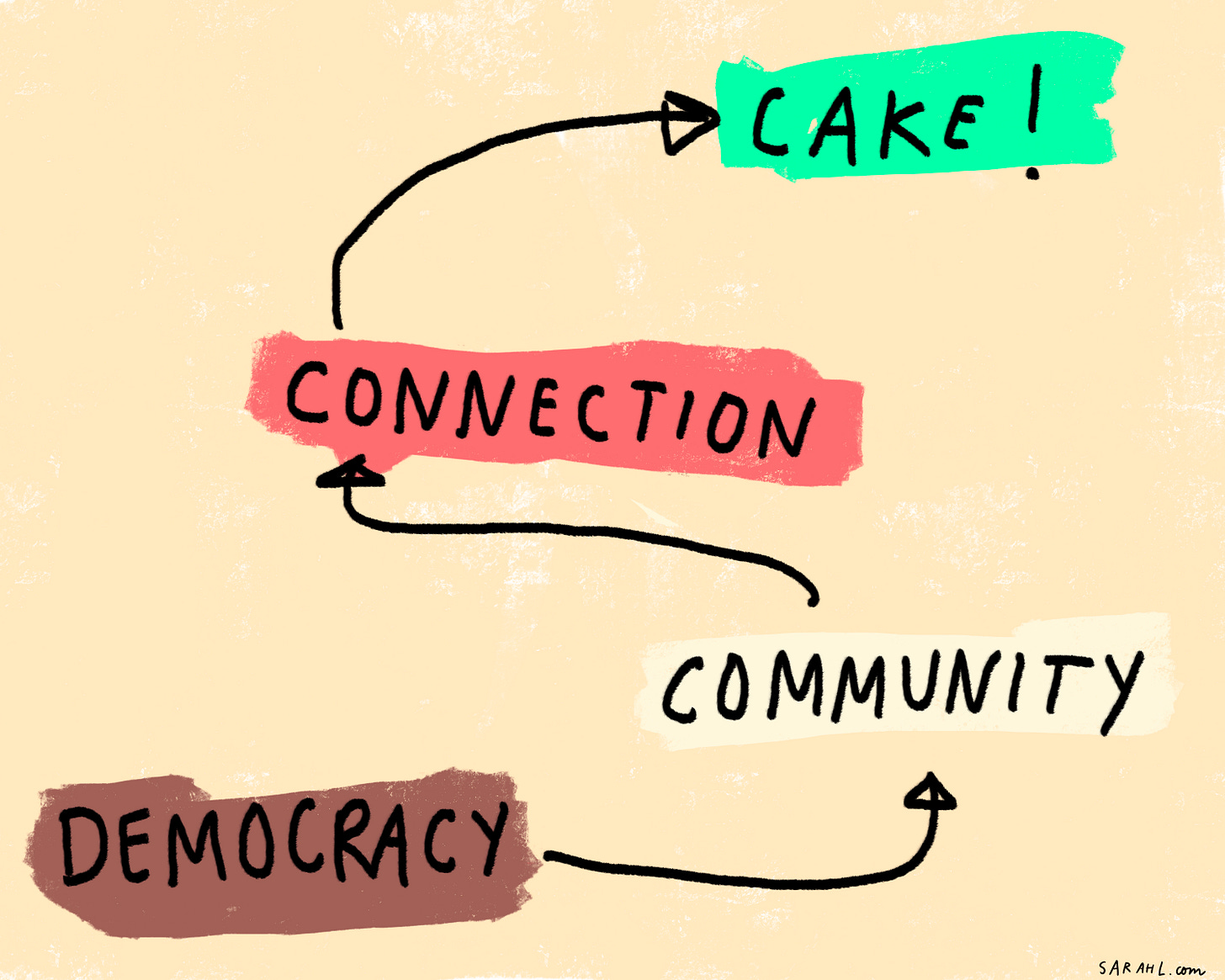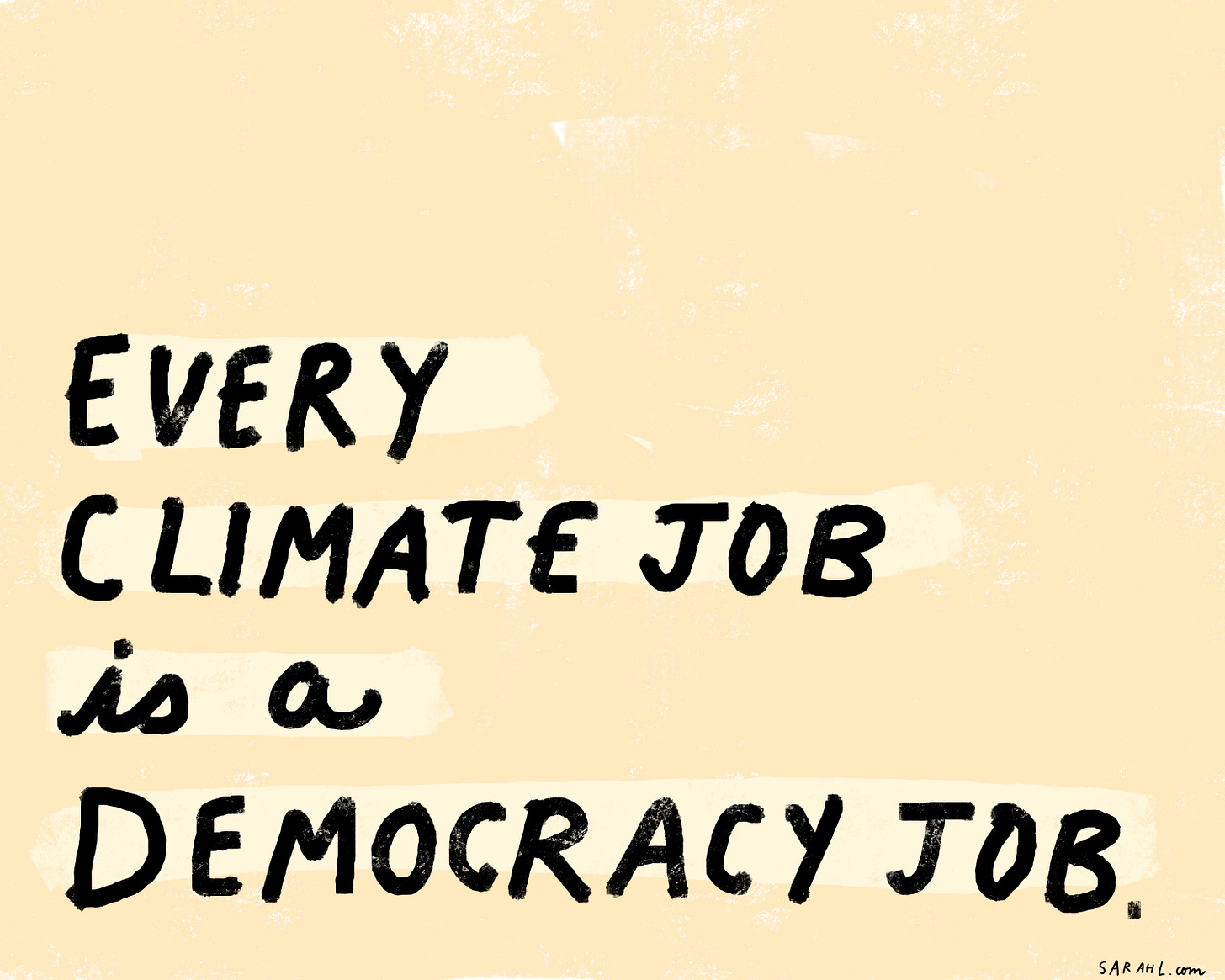Every climate job is a democracy job
Plus clumsy ice cream metaphors. (Part 1 of 3!)
🍫 Climate needs democracy: functional systems + robust public media.
🍦 Climate needs community: localized webs + mutual support.
🍓 Climate needs connection: Decentralized IRL/digi comms + 2-way sharing.
I’m attempting a three-parter, a neapolitan ice cream of a series, if you will. Welcome to part 1: Climate needs democracy. These (^) are the three things I hold to be true, and, in my view, present a sequential flow for how we save this motherloving (Happy Belated Mother’s Day!) world. The only thing to know is you have to eat the chocolate first, because if you don’t, the vanilla and strawberry cease to exist. (And also, who doesn’t eat the chocolate first?)
This three-part theory borrows from professor Victor Pickard’s 2019 book, Democracy Without Journalism? Democracy requires accountability, and good journalism is one wholesale supplier of accountability. But also, can we take climate action without democracy? With one green herring (China!), I think not. Although democracy itself doesn’t necessarily deliver climate action, it’s a mostly essential precondition. That said, the secondary and tertiary preconditions for effective climate action are community and connection. I don’t know what the quaternary precondition is, I just wanted to write the word quaternary.
The death of journalism has been greatly underexaggerated
As of 2023, the US has lost a third of its local news outlets, according to a Northwestern report. In Democracy Without Journalism?, Pickard writes specifically about the demise of public service journalism. He estimates that print newsrooms have lost half their staff since 2000. And he argues that commercialism has created this problem and the only way forward is a public-funded model. “Our goal,” he concludes, “should be to create a robust and well-funded media system that is truly public, designed for our digital age, and democracy-driven, not market-driven.”
In other words, we need MORE public media. Meanwhile, the Trump administration is handing Big Bird a pink slip. With no media, we can’t protect democracy, and with no democracy, we cannot protect climate. It’s as simple as that. But here’s a galling example to paint the anti-democratic impasto:
A few months ago, Greenpeace was ordered to pay $660M in damages, after a jury stacked with oil-friendly citizens ruled in favor of Big Oil in the Dakota pipeline case. But one of the most interesting, and barely reported (cuz no media!), parts of the story is that a pay-to-play newspaper dropped actual hard copies of their yellow reportage in the zip codes most relevant to the jury. Per Neiman:
The papers bear the tagline “Real data. Real value. Real news,” but their articles are largely anonymous, echo conservative talking points on key culture war issues, and frequently opine on the destructive nature and lawlessness of the pipeline protests in the rural community between 2016 and 2017.
Democracy doesn’t die in darkness. It dies in the bright light of fake news delivered to your North Dakota doorstep. And it takes climate down with it.
This says nothing of the digital misinfo that no doubt landed in these geographies as well, but those tactics are better known. What’s wild here is the co-opting of the look and feel of traditional media, creating a surround sound ecosystem of misinfo, presented as local news.
This is of course a tiny fraction of the antidemocracy-to-climate suppression pipeline (see what I did there?), but it’s the below-the-surface part of the iceberg (TIL this part is called the bummock!), and should demand our attention more than the ‘we can’t say climate anymore’ stories that inspire our noisier outrage — those are important too, but perhaps less important than the complete subversion of a working judicial system?
But I’m a climate girly
So why are so many of us fixated on our rote climate action work while democracy crumbles around us? I never thought of myself as a deck-chairs-on-the-Titanic type of gal, but a few month ago I was confronted with the reality that I was indeed making neat rows of loungers on the Promenade Deck. I had asked a climate activist and writer I revere to write something for me about electrifying LA in the wake of the fires, and she emailed back, “not now, we’re in a coup.” Again, for effect:
The sentence still bounces around in my brain, echoing loudly because I’ve cleared everything else out. In some ways, it’s the climate version of that ubiquitous Martin Niemöller quote: “First, they came for the…” Except it’s more like: When they came for democracy I said nothing, because I was…quietly trying to save the planet without using the word equity.
The thing about “climate needs democracy” is that it’s by no means a guarantee of climate success. Although 89% of people across the globe want their political leaders to take climate action, people still vote against climate and for more pressing concerns all the time. (Not because they’re bad, but because they have bills to pay and stresses to contend with that are way more important.)
So democracy is a precondition for climate action in most places. Of course the outlier here is China, where decades of tight control has paved the way for the most significant and brisk climate action on the planet. (But still, let’s be Costa Rica. Democracy and climate action and cute beach cafés with good smoothies!)
In the US, the majority of people who want to destroy democracy also want to destroy climate — to actually delete any record of it, and all accounting for it too. But climate organizations can’t shift mandates over night. So we’re often left to manage green business as usual, in a world that feels anything but usual.
Democratic action for climate satisfaction
While we don’t need to rank our existential threats, a fascist first™️ approach feels, with every passing day, like it’s rapidly getting upvoted on the apocalypse prevention To Do list. A byproduct of destroying fascism is destroying climate deniers, so this work has the added benefit of killing two evils with one stone (with apologies to the stone). But this requires a reclassification of sorts for the individual working the climate beat, and it’s why so many people I’ve been speaking to of late want to work on democracy, full stop. Climate is the fire of our lives. And democracy is the door we have to keep unlocked if we are to get to that fire.
My fave phrase, borrowed from Project Drawdown, and uttered to anyone who asks me about climate work (and anyone who doesn’t) is, Every job is a climate job. Because we need to infuse every type of work with climate and make it normative (working chief sustainability officers out of a job would mean we’ve won!). But perhaps an additional phrase needs to be, Every climate job is a democracy job.
In practice, it’s always been about thinking holistically. What can I do to shore up democracy and institutions as I work to advance climate? Climate work absent that framework feels nutty (see: we’re in a coup!). And for me, rigid brain that I am, reframing the nomenclature of our very work feels both necessary and helpful. For example, fighting the misinfo on Facebook in the federal election lead up here in Canada WAS and IS climate work. With news blocked on Canadian Facebook, bad actors swooped in to swarm feeds with anti-Carney fake news (that directed to fake CBC sites), a truly brazen attempt to undermine democracy, and also an anti-climate push. It’s no surprise that the people advocating for a well-funded CBC are the same people who believe that climate change is real. Also, their FU** the CBC campaign is funny, or rather fu**y. You should watch it.
These are scary times, and there’s no mincing that. But even as I fret that humanity is too overwhelmed by life and deadened by endless streams of digital nonsense, there are inspiring counter-examples everywhere. Serbia is out in the streets, demanding their public broadcaster be able to cover the protests overtaking their country. Led by a diverse group of the country’s students and union leaders, the non-hierarchical organizing is evidence of community power in action, which is the topic of part two of this series, Community: In truly Al Goreian fashion, I thought I’d invented the term civic muscle. But it’s being flexed everywhere, by brilliantly named groups like Warm Cookies of the Revolution, which bills itself as the ‘world’s first civic health club.’ More next week.
It’s my favourite season in Toronto. The cherry blossoms are out, and Bar Ape is open. If you come visit, I’ll take you. The only rule is that you have to walk there from wherever you are in the city. Wishing you soft serve, warm company, and good health.
This planet
How are you thinking about your climate work in the world RN? Let me know.
Last planet
Feel good homes with Drew was my first attempt at a pod. You all voted 85% in favor of more audio noodling, so noodle I shall. Thank you!
Stuff
→ Part of the challenge of this moment is the constant disorientations and realignments. Donald Trump, conscious consumer and degrowther? Of course he is nothing of the sort. But a world where kids have two good quality dolls is…lovely? I remember traveling to Argentina after default number 2,537, around 2010, and seeing a nascent Industria Argentina movement taking hold, with goods made at home, because no one would loan to them. There are parts of this reindustrialization that I love — local production, good quality products, and the jobs that come with that. It’s weird to see Democrats being the torch bearers of trade liberalization. But sometimes things are weird? And it’s ok to live with the upsidedown cake of it all right now.
→ My friend Kevin has launched balcony solar in the US. His company, Bright Saver, is a smart way to get some solar if you can’t roof it up, and you can still get in on the pilot in California. After reading the same articles as everyone else about German balcony solar, I got obsessed. Turns out Kevin and others did, too. These modular little units cannot solve everything, but they are a great and quick solution for lots of households.
→ Heat pump symposium! Sooo cool to see such energy in Canada. HRAI’s HP symposium went from from 300 to 1000 delegates in less time than it takes to say ground source heat pump. I always learn a bunch and come away with a true pearl or two at these things. This year: OMG if you get a combo HP washer dryer, you never have to worry about leaving the wet clothes in the washer for far too long (a regular thing, if you are a terrible housekeeper like moi). More efficient washing, and my son will never tell me his clothes smell like sweaty moss again?
→ My husband works in circularity and got to hear the OG, William McDonough, at last month’s conference in Denver. He made a poem out of McDonough’s keynote (reuse!), a snippet:
Net zero: More strange language for the children.
All sustainability is local.
Extended producer opportunity — go for it!
Thank you!
→Thank you new subscribers! Welcome welcome. Check out my about page for a bit more razzamattazz.
→I will never not love you tapping the 💚 below when you like an edition of this ‘sletter, or sending me a note with suggestions and ideas for how to improve it.
→ You can always help me juice the algo by sharing this newsletter with people you (hopefully) like, recommending it on your own stack, or upgrading your subscription.
People dancing
The Rockettes are really branching out.
Take good care!
Sarah








Just what I needed hear. Thank you!
I really ❤️ EVERY email post from you, Sarah!